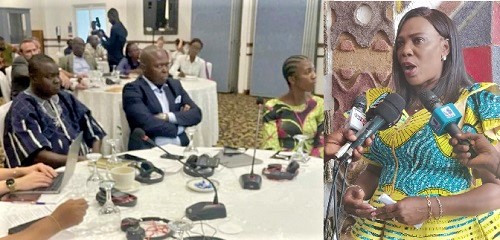A four-day inclusive climate action conference to establish practical ways to address waste management issues in C40 cities is underway in Accra.
The C40 cities is a global network of mayors of nearly 100 cities who are taking urgent action to confront climate crisis in their respective cities to create a future where everyone can thrive.
The cities are Abidjan, Accra, Addis Ababa, Ahmedabad, Amman, Hong Kong, Athens, Bangkok and Barcelona.
Others are Bengaluru, Berlin, Bogotá, Boston, Cape Town, Chengdu, Chennai, Chicago, Ciudad de México and Curitiba.
The rest include Dakar, Dalian, Dar es Salaam, Guangzhou, Hangzhou, Houston, Istanbul, Johannesburg, Karachi, Kolkata and Lagos.
The conference which began yesterday, will also deliberate on issues of waste management and how informal waste actors such as waste pickers and scavengers can actively participate in city waste policies and processes.
It is being attended by researchers and officials of the AMA, the cities of Rio de Janeiro and Lagos in Brazil and Nigeria, respectively.
Also present were officials from the International Organisation for Migration (IOM), the Federation of Canadian Municipalities (FCAM), the Deutsche Gesellschaft für Internationale Zusammenarbeit (GIZ), and the People’s Dialogue on Human Settlements and Footprints, all non-governmental organisations.
Informal sector
The Chief Executive Officer of the Accra Metropolitan Assembly, Elizabeth Sackey, said informal waste sector workers were agents of waste management optimisation.
"With the steady rise in urbanisation in our cities comes the reality of population increase and increase in migration, increase in resource consumption, increase in informal labour and informal housing trends and so on," she said.
She mentioned some of the achievements the city of Accra had gained since joining the inclusive climate action programme.
"We have had capacity-building sessions which brought together informal waste sector leaders and members of the Ghana Trades Union Confederation (TUC).
“We also held an inter-agency roundtable which helped build a regional consensus on how to advance the development of a regional informal sector policy and formed key partnerships for collaboration," she added.
Discussions
The panellists discussed the relationship between city governments and informal sector waste workers, particularly the youth, women and migrants who they said were often disproportionately represented and disadvantaged in the informal economy.
They also deliberated on how cities could deliver inclusive systems and contribute to just transition, particularly, for those groups.
The discussants further recommended that informal waste actors needed to be included in all forms of deliberations and decision-making processes.
They also suggested that an insurance policy should be designed for them to increase output, and the collection of workers data to serve as identification.
Writer’s email: delali.sika@graphic.com.gh

